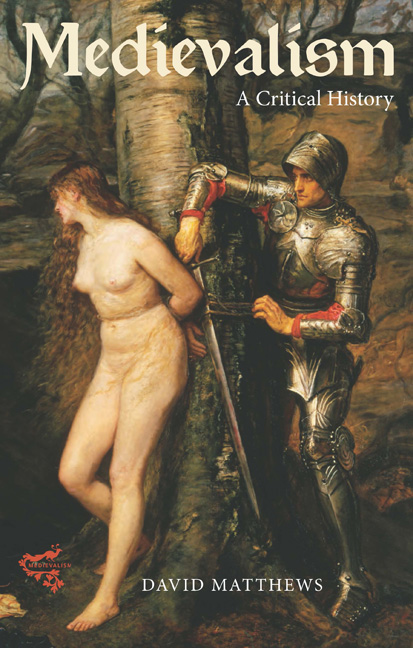Book contents
- Frontmatter
- Dedication
- Contents
- List of Illustrations
- Preface
- Acknowledgements
- Abbreviations
- Introduction
- I TAXONOMIES
- II TIME, SPACE, SELF, SOCIETY
- III HISTORY AND DISCIPLINE
- Conclusion Against a Synthesis: Medievalism, Cultural Studies, and Antidisciplinarity
- Afterword
- Appendix I The Survey of Reenactors
- Appendix II Key Moments in Medievalism
- Bibliography
- Index
Afterword
- Frontmatter
- Dedication
- Contents
- List of Illustrations
- Preface
- Acknowledgements
- Abbreviations
- Introduction
- I TAXONOMIES
- II TIME, SPACE, SELF, SOCIETY
- III HISTORY AND DISCIPLINE
- Conclusion Against a Synthesis: Medievalism, Cultural Studies, and Antidisciplinarity
- Afterword
- Appendix I The Survey of Reenactors
- Appendix II Key Moments in Medievalism
- Bibliography
- Index
Summary
Aperformance of Lavinia Greenlaw's A Double Sorrow – her “version,” rather than a translation, of Troilus and Criseyde – took place in February 2014 and was the last thing of a medievalist kind I saw in the very last stages of writing this book. Or rather, it was the point at which I drew the line, deciding that some end, however arbitrary, must be put to the unstoppable flow of medievalisms which quickly becomes apparent to anyone who chooses to work on them.
Running slightly late for the performance at London's Southbank Centre, and having no idea what to expect, we arrived at the venue a little out of breath to find no signage and no directions to the now imminent performance. Eventually, more by process of elimination than anything else, we found our way to a side corridor of the centre, pushing through a roped-off entrance, walking past young men and women limbering up for a dance class in a long corridor and then, when there was almost nowhere further to go, finding a sign for A Double Sorrow.
This seemed typical of Chaucer's obliqueness and marginality in his own city. One has to go Kent to find Chaucer's medievalist traces, which are suddenly ubiquitous. In Canterbury, the city that Chaucer's pilgrims do not even reach, Chaucer's name is everywhere, as if guaranteeing that yes, this really is a medieval place. Even the cafe of Turner Contemporary, the art gallery on the beach at Margate, serves Chaucerian fish and chips. But in Bardic London, already gearing up for the quatercentenary of Shakespeare's death in 2016, and where a new playhouse had just opened next to the Globe Theatre, Chaucer's is a shadowy presence, more appropriate to a customs official than a major poet.
So here he was, right out on the edges of the Southbank Centre, in what felt like the basement, in a bare room with a starkly simple production of his poem – no stage, just some candles, which are lit and then extinguished in the course of the performance. A cellist; three actors, Greenlaw herself in the role of a narrator.
- Type
- Chapter
- Information
- MedievalismA Critical History, pp. 183 - 184Publisher: Boydell & BrewerPrint publication year: 2015



